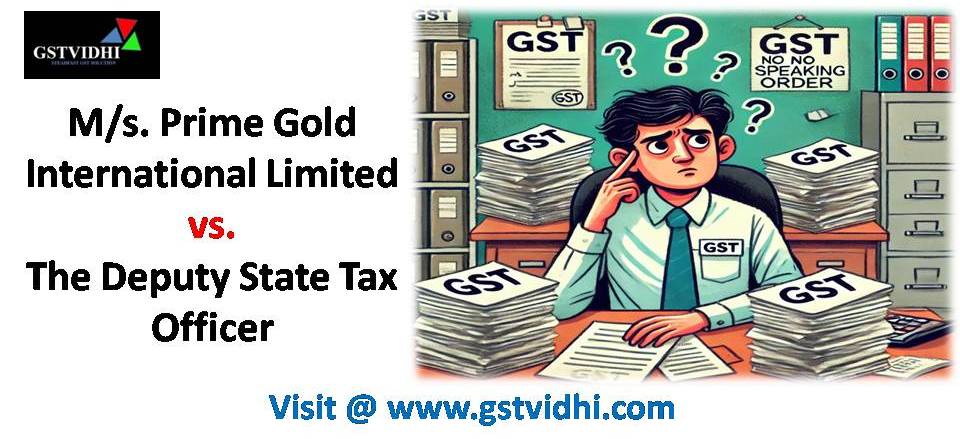
M/s. Prime Gold International Limited vs. The
Deputy State Tax Officer (Intelligence) & Ors. (W.P. No. 32773 of 2024)
Introduction: In a notable case, M/s. Prime Gold International Limited vs. The
Deputy State Tax Officer (Intelligence) & Ors. (W.P. No. 32773 of 2024),
the Hon’ble High Court of Judicature at Madras set aside an adjudication order,
emphasizing the importance of reasoned orders and adherence to natural justice.
Delivered on November 19, 2024, by Hon’ble Justice Mohammed Shaffiq, the
judgment highlights the judiciary's role in ensuring administrative fairness
while balancing the principle of alternate remedies.
Facts of the Case: The petitioner, M/s. Prime Gold International
Limited, is engaged in the manufacture and supply of billets and TMT bars.
Registered under the Goods and Services Tax (GST) Act, the petitioner duly
filed returns and paid taxes. However, during the fiscal year 2021-22, the
petitioner’s business premises in Hosur, Tamil Nadu, were inspected by the
State Tax Officer, Salem.
The inspection raised concerns regarding
production discrepancies. While the petitioner reported the manufacture of
57,896.05 metric tonnes of TMT bars, the adjudicating authority determined,
based on electricity consumption, that only 57,122.90 metric tonnes could have
been manufactured. The difference of 773.15 metric tonnes was treated as
"suppressed production," leading to a best judgment assessment and
tax demand.
Submissions by the Petitioner: The petitioner challenged the adjudication order dated July 29,
2024, on several grounds:
1.
Reasoned
Explanation Ignored: The petitioner
submitted a detailed explanation addressing the alleged production
discrepancies, highlighting:
·
Superior quality
billets were procured, enhancing production efficiency.
·
A new furnace reduced
power consumption, leading to increased output.
·
The petitioner
purchased 8,068.55 metric tonnes of billets, which justified the higher
production volume.
These points were not
considered by the adjudicating authority.
2.
Non-Speaking
Order: The adjudicating
authority dismissed the petitioner’s objections with a generic statement:
"taxpayer's objections are not accepted." The petitioner argued that
such a non-speaking order violated principles of natural justice, as it failed
to provide reasons for rejecting the objections.
3.
Violation
of Natural Justice: The petitioner
contended that adverse civil consequences stemming from the order required a
detailed examination and reasoning to ensure fairness.
Submissions by the Respondents: The respondents, represented by the Additional Government
Pleader, argued:
1.
Availability
of Alternate Remedy: The petitioner had a
statutory right to appeal against the adjudication order. The court should
refrain from entertaining the writ petition due to the availability of
alternate remedies.
2.
Jurisdiction
of Adjudicating Authority:
The adjudicating authority acted within its jurisdiction in conducting the
assessment and issuing the impugned order.
Findings of the Court: After hearing both sides, the Hon’ble High Court made the
following observations:
1.
Importance
of Reasoned Orders: Justice Mohammed
Shaffiq emphasized that orders resulting in adverse civil consequences must
provide reasons. The failure to assign reasons in the impugned order rendered
it procedurally flawed and violative of natural justice.
2. Violation of Principles of Natural Justice: The court noted that the adjudicating
authority’s failure to address the petitioner’s objections invalidated the
order. A mere rejection without explanation does not constitute due
consideration.
3. Exceptions to Alternate Remedies: While acknowledging that writ petitions are
generally discouraged when alternate remedies exist, the court clarified
exceptions, including violations of natural justice and non-speaking orders. The
case fell within these exceptions, justifying the court’s intervention.
4.
Directions
to the Respondents: The court set aside
the impugned order and directed the respondents to reassess the matter after
granting the petitioner a reasonable opportunity of being heard.
Judgment: The writ petition was
allowed with the following directions:
·
The impugned order
dated July 29, 2024, was quashed.
·
The respondents were
granted liberty to issue a fresh order in accordance with law, ensuring due
consideration of the petitioner’s submissions.
·
The court clarified
that the decision should not be construed as expressing any opinion on the
merits of the case.
Conclusion: The Madras High Court’s judgment in M/s. Prime Gold
International Limited vs. The Deputy State Tax Officer (Intelligence) &
Ors. reiterates the importance of administrative fairness in tax assessments.
It serves as a reminder to authorities that reasoned decisions are integral to
upholding natural justice and fostering taxpayer confidence.
For taxpayers, this case underscores the
importance of providing detailed explanations during assessments and
challenging orders that fail to address objections. It also highlights the
judiciary’s role in intervening in cases where procedural lapses result in
manifest injustice.
Disclaimer: All the Information is based on the notification, circular and order issued by the Govt. authority and judgement delivered by the court or the authority information is strictly for educational purposes and on the basis of our best understanding of laws & not binding on anyone.
Find the Attachment (Press on Click Here )
Click here